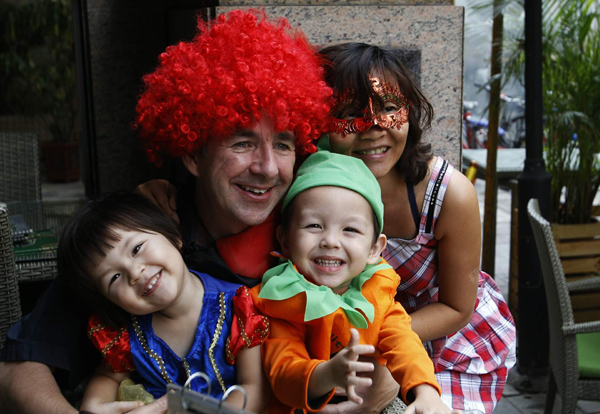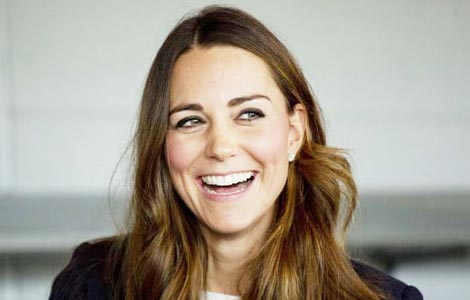Color-blind love
Updated: 2013-10-30 23:40
By Xu Jingxi (China Daily)
|
||||||||
Marrying someone from another race can launch couples into a lifetime of discovery and compromise, Xu Jingxi reports in Guangzhou.
|
 |
|
A Chinese mother, her foreign husband and their mixed-race children dress up for a Halloween party in Guangzhou. Photos by Zou Zhongpin / China Daily |
Disney's Snow White runs after Tim Burton's Red Queen. Super Mario shares his toy bricks with Bumble Bee. And Batman bounces among tables, filling his basket with candies and handing them out to replay the game.
Dressed up as these much-loved characters, about 30 children between 11 months and 6 years old enlivened a gathering in Guangzhou on Sunday, four days ahead of Halloween.
What looked like the cutest Halloween party ever was held by a QQ group of Chinese mothers or mothers-to-be, with babies of mixed ethnicity. The women met their husbands of a different race in the South China metropolis, where many foreigners come for study, business and jobs.
Overcoming different perspectives about marriage and children's education is a big part of the love stories of mixed-race couples in China, says the QQ group's co-founder Huang Yuzhi, whose husband is from Albania.
Herold Balla, Huang's husband, came to Guangzhou in 2005 to pursue international trade opportunities. Three years later, he met Huang at a party hosted by a mutual friend. Their 2-year-old son Alex is a popular advertising model, like many other mixed-blood children. He shoots as many as eight ads every month.
The European father has often been puzzled by some Chinese customs, from gift-giving traditions at weddings to discipline for children.
Huang says she and her husband often argue about whether "stick parenting" is acceptable, a divergence that is often discussed by Chinese mothers in the QQ group.
"I think it's OK to spank Alex if he does something wrong, but my husband thinks it is unacceptable even if it's just hitting Alex's palm with the flat of my hand," says Huang.
Balla chooses to give way and "do in Rome as the Romans do". "Mutual understanding and respect are important in relationships, especially in a mixed marriage," Balla says.
However, not all foreign husbands are ready to embrace Chinese customs.
Zhang, a mother of two, and her Canadian husband fell in love at first sight and got married eight months after their first meeting in 2005.
Chinese women have the tradition of zuoyuezi, when they are confined indoors for a month after delivering a baby to rest and recover. During the maternity month, maids are hired to take care of the newborn and the mother.
"We didn't hire a maternity matron. My husband said that zuoyuezi is an excuse made for lazy women. He argued that babies should be taken care of by their mothers instead of strangers," Zhang sighs.
"Yet I can understand why he was so tough. Westerners don't have the tradition of zuoyuezi, and my mother-in-law raised her three children as a single mother so it's reasonable that my husband doesn't think it a problem for me to look after babies on my own."
Zhang stayed in her hometown in Wuhan for the maternity month after giving birth to her elder son because her mother was able to take care of her there.
Wang Xiaoying, a 60-year-old retired primary school teacher from Hunan province, was worried when her daughter working in Guangzhou told her that she was marrying a man from Lebanon.
"I heard that men in the Middle East are male chauvinists. But I'm happy to have found that my son-in-law is polite, easygoing and respects the elders a lot," Wang says with a smile.
Wang's Lebanese son-in-law is not a Muslim and so he can share and enjoy the spicy Hunan cuisine and foods "strange" to him such as pork liver that Wang cooks.
"I think there is nothing bad about my daughter marrying a foreign man. Nowadays more Chinese parents have the same idea because China is open to the world and foreigners can be seen everywhere," Wang says.
Zou Qiuqiong, who married a man from Tanzania who was studying at a college in Guangzhou in 2005, recalls how they caught people's eyes when they walked in the street hand-in-hand during their dating days.
They once ran into an embarrassing situation in a restaurant when four drunk Chinese men laughed at her boyfriend and flirted with her, saying: "Why do you choose to date a black guy? Aren't we better than him?"
"I gave them the cold shoulder. I don't care what others say," Zou says. "My husband loves me very much and is a knowledgeable and wise man. I adore him. Love is color blind."
Guangzhou is now home to one of the country's biggest populations of Africans. People are no longer surprised at the sight of a Chinese-African mixed family, but many still hold the same discriminating view about Africans and their mixed-blood children "just because of the darker skin tone", says Zou, a mother of three.
Before sending her own children to kindergarten, Zou says, she told them they just need to "tell other kids with calm and confidence that people in the world have three main skin colors and they have a darker skin because they have an African father and a Chinese mother".
Another challenge for the parents is coping with the high educational expenses for their mixed-blood children who hold a foreign passport.
Huang Danli, who married a Canadian man, frets about the high fee of 8,000 yuan ($1,313) per month that the kindergarten is going to charge for her daughter.
"And we will probably have to give about 100,000 yuan to the primary school in addition to the tuition fees," Huang says. "But I still plan to let my daughter finish her primary education here before we go to Canada. I hope that she can acquire the Chinese language, which will be useful for her future since China is becoming more and more powerful."
Contact the writer at xujingxi@chinadaily.com.cn.

 Post-baby Duchess
Post-baby Duchess
 Victoria Beckham S/S 2014 presented during NYFW
Victoria Beckham S/S 2014 presented during NYFW
 'Despicable' minions upset Depp's 'Lone Ranger' at box office
'Despicable' minions upset Depp's 'Lone Ranger' at box office
 'Taken 2' grabs movie box office crown
'Taken 2' grabs movie box office crown
 Rihanna's 'Diamonds' tops UK pop chart
Rihanna's 'Diamonds' tops UK pop chart
 Fans get look at vintage Rolling Stones
Fans get look at vintage Rolling Stones
 Celebrities attend Power of Women event
Celebrities attend Power of Women event
 Ang Lee breaks 'every rule' to make unlikely new Life of Pi film
Ang Lee breaks 'every rule' to make unlikely new Life of Pi film
Most Viewed
Editor's Picks

|

|

|

|

|

|
Today's Top News
US business asks easing of market barriers
Benefit held for NYC official's ex-campaign treasurer
HIV epidemic needs education, not bath house bans
Tian'anmen jeep crash a terror attack
US spied on Chinese cities: report
Legislation to help reduce pollution
Survey examines education gap
Govt pledges more housing
US Weekly

|

|







